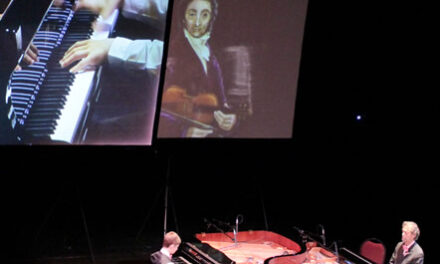It started out as a simple request to expand the very meager repertoire for the combination of clarinet, piano, and voice. Todd Palmer, internationally celebrated clarinet virtuoso, was looking for a complement to Schubert’s “Shepherd on the Rock” and asked composer Ricky Ian Gordon for a modest ten-minute piece. Initially reticent to add even such a small project to his workload, Gordon awakened one morning at 4:00 and had an epiphany for an extended work based on the very popular Greek legend of Orpheus and Euridice. The entire text was written from a lightning bolt of inspiration. Rather than an encore-like snippet, there was the artistic birth of a full-length phenomenal and unique stage work for soprano, clarinet, piano, dancers, and chairs.
This, the final presentation of Long Leaf Opera‘s 10th anniversary season-festival, also proved to be the artistic apex of their month-long presentation of a diverse set of operas and concerts.
Gordon’s selection of this famously tragic love story is nothing new. The story of Orpheus and Euridice was set to music as far back as the beginnings of opera by Monteverdi up to Offenbach and a host of others along the way and beyond. It was once thought that dance had to be part of any opera, particularly by the French, so Gordon’s inclusion of dancers is far from revolutionary either. What makes this work so special is his synthesis of all the elements into characters that meld and work together to advance the story. Perhaps “everything old is new again,” but this is no copycat, rehashed larceny but truly original, artistic genius.
Gordon spoke to the audience before the performance and told us that the work was written with soprano Elizabeth Futral in mind. It was first performed in October, 2005, as part of Lincoln Center’s “New Visions” series with Futral and Todd Palmer. The Chapel Hill performances were the first in a revised, distinct, two-act version.
Dancers in tattered, almost slovenly costumes slowly emerged one by one onto a darkened stage that featured only a line of sturdy, wooden chairs – props that became a central part of the storytelling. Their fluid, rounded movements would go on for almost ten minutes without any sounds. Finally Palmer, portraying Orpheus, came out with his clarinet, and we heard the first sounds of this marvelous score. Futral emerged as Euridice and proceeded to play the doomed lover with a combination of innocence and sensuousness that embodied the complex gradations of love. She also proved to be an adept dancer and actress and was especially poignant in her death scene. One “dancer,” Simon Mulligan, split off from the Doug Varone dance troupe and took his place at the piano, which was on a movable platform.
Labeling this work an “opera” is stylistically questionable and invariably puts off a segment of the population that would otherwise venture out and open their minds and wallets. At times there was a schizophrenic quality to Futral’s vocal quality as she slid from a Broadway style to a more wide-vibrato operatic style. It was here, as in many of the other productions in the festival, where enunciation and understanding of the text suffered. It was especially unfortunate here because the text was missing from the program – something the composer had expected to be present.
I mentioned the chairs previously; this was something that needed to be seen to be fully appreciated. The seven dancers used these as an extension of their bodies and finally as a symbolic ascension of Euridice’s spirit to your particular concept of the afterlife. There, thirty feet above the stage, was a magnificent mobile of heavy chairs. The pianist also had a grand time being pushed around the stage on his platform by the dancers. Gordon’s score is vibrant, lyrical, accessible (meant as a compliment!), and highly original but with hints of Sondheim, Bernstein, and Copland. He should extract a suite for concert performance. Pianist Mulligan was expressive with an understated virtuosity that held together the musical fabric. Todd Palmer played the long, complex score entirely from memory, and he ably communicated the dramatic elements of his double duty.
Long Leaf Opera is on the move again. First it was Durham’s Carolina Theater, then Chapel Hill’s Memorial Hall. It was announced by Artistic Director Randolph Umberger that next year’s festival will be moving to Raleigh’s Fletcher Opera Theater. Unfortunately, during that pre-show monologue, the audience was sternly reprimanded for not fully supporting Long Leaf as the primary reason for the move to a smaller venue. Although he admitted that he was “preaching to the choir,” this does little for audience morale and those who do attend and support Long Leaf. Selling opera to American audiences is akin to getting us to attend professional soccer and even harder when it’s new works. That said, we look forward to next year’s festival.











